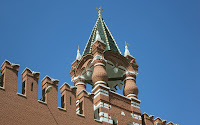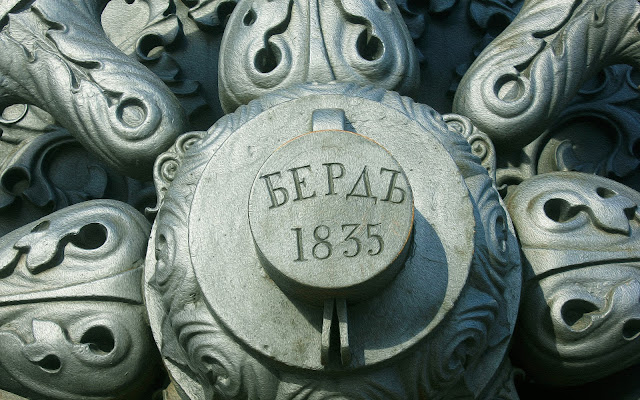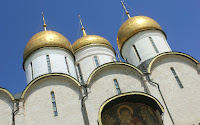The Moscow Kremlin (Russian: Московский Кремль) or simply the Kremlin, is a fortified complex in the center of Moscow, overlooking the Moskva River to the south, Saint Basil's Cathedral and Red Square to the east, and the Alexander Garden to the west. It is the best known of the kremlins (Russian citadels) and includes five palaces, four cathedrals, and the enclosing Kremlin Wall with Kremlin towers. In addition, within this complex is the Grand Kremlin Palace that was formerly the Tsar's Moscow residence. The complex now serves as the official residence of the President of the Russian Federation and as a museum with 2,746,405 visitors in 2017.
The name "Kremlin" means "fortress inside a city", and is often also used metonymically to refer to the government of the Russian Federation in a similar sense to how "White House" refers to the Executive Office of the President of the United States.
 Grand Prince Ivan III organised the reconstruction of the Kremlin, inviting a number of skilled architects from Renaissance Italy, including Petrus Antonius Solarius, who designed the new Kremlin wall and its towers, and Marcus Ruffus who designed the new palace for the prince. It was during his reign that three extant cathedrals of the Kremlin, the Deposition Church, and the Palace of Facets were constructed. The highest building of the city and Muscovite Russia was the Ivan the Great Bell Tower, built in 1505–08 and augmented to its present height in 1600. The Kremlin walls as they now appear were built between 1485 and 1495. Spasskie gates of the wall still bear a dedication in Latin praising Petrus Antonius Solarius for the design.
Grand Prince Ivan III organised the reconstruction of the Kremlin, inviting a number of skilled architects from Renaissance Italy, including Petrus Antonius Solarius, who designed the new Kremlin wall and its towers, and Marcus Ruffus who designed the new palace for the prince. It was during his reign that three extant cathedrals of the Kremlin, the Deposition Church, and the Palace of Facets were constructed. The highest building of the city and Muscovite Russia was the Ivan the Great Bell Tower, built in 1505–08 and augmented to its present height in 1600. The Kremlin walls as they now appear were built between 1485 and 1495. Spasskie gates of the wall still bear a dedication in Latin praising Petrus Antonius Solarius for the design.

Red Square and the Kremlin are the historical, geographic and spiritual heart of Moscow, as they have been for nearly 900 years. The mighty fortress, the iconic onion domes of St Basil’s Cathedral and the granite mausoleum of Vladimir Lenin are among the city’s most important historical sights. The surrounding streets of Kitay Gorod are crammed with churches and old architecture. This is the starting point for any visit to Moscow.
 Show in Lonely Planet
Show in Lonely Planet
The name "Kremlin" means "fortress inside a city", and is often also used metonymically to refer to the government of the Russian Federation in a similar sense to how "White House" refers to the Executive Office of the President of the United States.
 Grand Prince Ivan III organised the reconstruction of the Kremlin, inviting a number of skilled architects from Renaissance Italy, including Petrus Antonius Solarius, who designed the new Kremlin wall and its towers, and Marcus Ruffus who designed the new palace for the prince. It was during his reign that three extant cathedrals of the Kremlin, the Deposition Church, and the Palace of Facets were constructed. The highest building of the city and Muscovite Russia was the Ivan the Great Bell Tower, built in 1505–08 and augmented to its present height in 1600. The Kremlin walls as they now appear were built between 1485 and 1495. Spasskie gates of the wall still bear a dedication in Latin praising Petrus Antonius Solarius for the design.
Grand Prince Ivan III organised the reconstruction of the Kremlin, inviting a number of skilled architects from Renaissance Italy, including Petrus Antonius Solarius, who designed the new Kremlin wall and its towers, and Marcus Ruffus who designed the new palace for the prince. It was during his reign that three extant cathedrals of the Kremlin, the Deposition Church, and the Palace of Facets were constructed. The highest building of the city and Muscovite Russia was the Ivan the Great Bell Tower, built in 1505–08 and augmented to its present height in 1600. The Kremlin walls as they now appear were built between 1485 and 1495. Spasskie gates of the wall still bear a dedication in Latin praising Petrus Antonius Solarius for the design.
Red Square and the Kremlin are the historical, geographic and spiritual heart of Moscow, as they have been for nearly 900 years. The mighty fortress, the iconic onion domes of St Basil’s Cathedral and the granite mausoleum of Vladimir Lenin are among the city’s most important historical sights. The surrounding streets of Kitay Gorod are crammed with churches and old architecture. This is the starting point for any visit to Moscow.
 Show in Lonely Planet
Show in Lonely Planet

































































































Комментариев нет:
Отправить комментарий